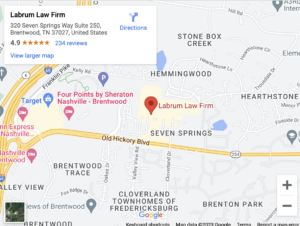
The term “burden of proof” refers to the responsibility of proving the claim at issue. If you have the burden of proof, you must prove your claim. If the opposing party has the burden of proof, it is they who must prove you wrong, not the other way around. If you are the one who filed the claim, then you have the initial burden of proof.
After you determine who has the burden of proof, you must determine the exact standard of proof to use. How strong must your evidence be to win your claim? The concept of burden of proof applies to all sorts of personal injury claims, from car wrecks to slip and fall accidents. It even applies to wrongful death claims.
“Beyond a Reasonable Doubt”
“Beyond a reasonable doubt” is by far the most famous articulation of a burden of proof. It does not apply to personal injury claims—only to criminal prosecutions.
It applies to murder charges, for example, but not to wrongful death claims. “Beyond a reasonable doubt” is the most difficult of all standards of proof to meet.
“A Preponderance of the Evidence”
A preponderance of the evidence is the standard of proof that applies to most personal injury claims. It is also one of the easiest to satisfy. All you need to meet the demands of “a preponderance of the evidence” is to present enough evidence to convince the court that your version of events is more than 50% likely to be true.
If “beyond a reasonable doubt” requires 98% certainty (nobody has ever tried to put an exact number on it), then “a preponderance of the evidence” only requires 51% certainty.
“Clear and Convincing Evidence”
The “clear and convincing evidence” standard applies to certain types of claims, such as fraud claims and demands for punitive damages in personal injury claims. “Clear and convincing evidence” is a more difficult standard to meet than “a preponderance of the evidence,” but it is an easier standard to meet than “beyond a reasonable doubt.”
What You Have To Prove To Win a Negligence Claim
Negligence claims are by far the most commonly asserted of all personal injury claims. To win a negligence claim, you must prove:
- The defendant owed the victim a duty of care;
- The defendant failed to meet the demands of their duty of care;
- The victim suffered a personal injury (usually a physical injury);
- The defendant’s breach of duty caused the victim’s injury; and
- Given the fact of the defendant’s breach of duty, the victim’s injury would be foreseeable to a “reasonable person.”
To win a negligence claim, the victim must prove all of the foregoing facts by “a preponderance of the evidence.”
Affirmative Defenses
Normally, a defendant asserts a defense by denying the victim’s evidence and trying to poke holes in its credibility. An affirmative defense, however, is different.
An affirmative defense is one that the defendant, not the victim, must initiate and prove. The burden of proof switches from the victim to the defendant when the defendant asserts an affirmative defense. There are a limited number of affirmative defenses, including:
- Comparative Fault: In a comparative fault claim, the defendant asserts that the victim was at least partially at fault for their own injuries. In Tennessee, this defense can negate the victim’s claim entirely or reduce their compensation, depending on the level of fault assigned to each party.
- Assumption of risk: In an assumption of risk defense, the defendant asserts that the victim understood and agreed to the risks of the activity that injured them. Accordingly, they assumed the risk, and the defendant should not bear liability for them.
- Failure to mitigate damages: This is only a partial defense. When the defendant asserts this defense, they are asserting that the victim did not do all they could have to minimize their own damages.
- Failure to comply with the statute of limitations deadline: Under Tennessee’s statute of limitations, the victim of a personal injury must file a lawsuit over their injury within only one year after the accident in most cases. If the victim fails to file a lawsuit by the deadline, a court will dismiss their claim at the defendant’s request.
Comparative fault is probably the most commonly asserted affirmative defense.
Consult With an Experienced Nashville Personal Injury Lawyer
Have you or have you not met your burden of proof? That depends on the quality of your evidence and the persuasiveness with which you can present that evidence. Both depend largely on the quality of your lawyer.
If you think you might have a claim, contact us at (615) 338-9500 to schedule a free initial consultation with an experienced Nashville personal injury lawyer.


